The year 2014 comes to a close, and it is a time to reflect on the past. Let us remind you what happened this year in the gambling industry in Russia, remind you of the most important events for the gaming and entertainment industry in general, and for ordinary players in particular.
Gambling Zones in Russia
Eight years ago, the deputies of the State Duma adopted the law "On state regulation of the organization and conduct of gambling and on Amendments to Certain Legislative Acts of the Russian Federation". The idea was bold: firstly, to clean the Russian cities of casinos; secondly, to develop the country's backward regions using the gambling industry. Therefore, areas for the construction of future casinos were allocated in the open field, far away from major cities.
The construction of four gambling zones was planned in 2006:
- Altai Krai - Siberian Coin.
- Kaliningrad region - Yantarnaya.
- Krasnodar Krai - Azov City.
- Primorsky Krai - Primorye.
The State Duma made amendments to the Federal Law "On state regulation of the organization and conduct of gambling and on Amendments to Certain Legislative Acts of the Russian Federation" on July 22, 2014, which provided the creation of two gambling zones:
5. Crimea.
6. Sochi.
It is worth noting that in 2006, many experts in the gambling industry doubted that Russia would be able to replicate the experience of American Las Vegas; nonetheless, the decision was made. Let's examine what happened in these gambling zones this year and what prospects they hold for the future.
Azov City
UPD: The Azov City gambling zone does not operate anymore.
Azov-City is the most successful gambling zone at the moment. The first casino, Oracle, was built by the Kazan-based Royal Time Group in January 2010. The area of the casino at that time was approximately 4,000 m². In September 2010, this company launched the second phase of the project. On November 1, 2014, the third phase of the project was completed with the opening of the Oracle entertainment complex, spanning 7,900 square meters. The complex featured new casino halls accommodating 40 gaming tables and 850 slot machines, a hotel with 90 rooms, and a spa center.
The company Royal Time Group totally invested 2.3 billion rubles in the project, and their affairs are going not bad - attendance increases every year and tax payments increase, respectively. For example, in 2013, 400,000 players visited the casino Oracle. This year, their number reached 600,000, and the forecast for 2015 is up to 1 million visitors.
Therefore, the Royal Time Group continues to develop its business. A concert and entertainment complex is currently being built. It should be put into commission in the third quarter of 2015. In addition, preparatory works are held for the construction of the first phase of an integrated resort with gambling component of the total area of over 80,000 square meters, which will include 250 hotel rooms, casino halls and other services for a high-quality recreation of guests; as well as hotel and entertainment complex that covers an area of 45,000 square meters, and 15,000 m2 of them will be occupied by casino halls, and the remaining area will be used for more than 400 hotel rooms. The company estimates that the total investment in the first integrated resort will be about 10 billion rubles, and the sum for the construction of the hotel and entertainment complex will be 7 billion rubles.
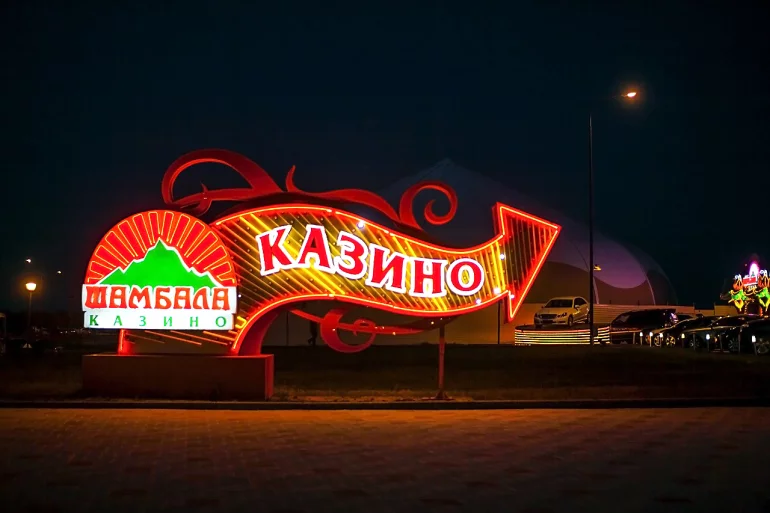
JSC "Shambala" is the second operator to work in this gambling zone. It opened two casinos: Shambala in 2010 and Nirvana in 2013. These casinos are smaller. Their areas are 1,400 and 1,500 square meters, respectively, and they cost about 175 million rubles. Currently, the second phase of the project, Shambhala, is active. The area of the casino will be increased to 18,000 square meters. New restaurants, concert areas, and a five-star hotel with 120 rooms will be built. The investment will comprise approximately 1.5 billion rubles.
Generally, Azov City is undergoing development. However, in the summer of 2014, investors almost had a heart attack. The Federal Law of July 22, 2014 "On Amendments to the Federal Law" On state regulation of the organization and conduct of gambling and on Amendments to Certain Legislative Acts of the Russian Federation" implied the elimination of Azov-City due to the opening of a gambling zone in Sochi.
Of course, Sochi is more prospective from the point of view of the gambling business compared to Yeisk. Still, after the closing of Azov City two and a half thousand people would lose their jobs, and the budget would lose 10 billion rubles of annual income, and reputational costs - who wants to invest money in the construction of casinos, if in a few years they could just be closed? Taking into consideration these circumstances, it was decided not to disturb the gambling zone Azov City.
Siberian Coin
The gambling zone Siberian Coin is physically located in the Altai Krai, not far from Barnaul. It is bordered by the tourism and recreation zone "Turquoise Katun," and they share common communications and infrastructure. The initial project for the entire gambling zone involved the construction of 15 casinos, 30 hotels accommodating 3,000 visitors, and 10 gambling and entertainment complexes. Thirty billion rubles of investments are expected to be attracted to the construction of the gambling zone.
Three companies are operating in the Siberian Coin: Alti from Kemerovo, RTG Siberia, a subsidiary of the Kazan-based Royal Time Group, and JSC Energy M from Yoshkar-Ola.
Energy M surprised the public: in December 2011, the company won the right to lease 6.6 hectares for the construction of hotels and casinos, provided that it would complete the project and enter into an agreement under which it was obliged to invest 580 million rubles and complete the construction by 2015. However, the company has not lifted a finger, and the construction has still not begun.
RTG-Siberia became the operator of the Siberian Coin only in March 2014. Now the concept of a gambling cluster is being developed, and the company promises to build casinos with hotels by 2019.
In November, we will complete the conceptual planning and start creating the project, and then determine the terms of construction," said Olga Khalitova, the representative of the resident. - RTG-Siberia pledged to invest 1.1 billion rubles in the construction of an entertainment complex, but, according to specialists of the company, the volume of the investment may rise by half during the realization of the project. The activities of Royal Time Group in Azov City lead us to believe that these promises should not remain just empty words.
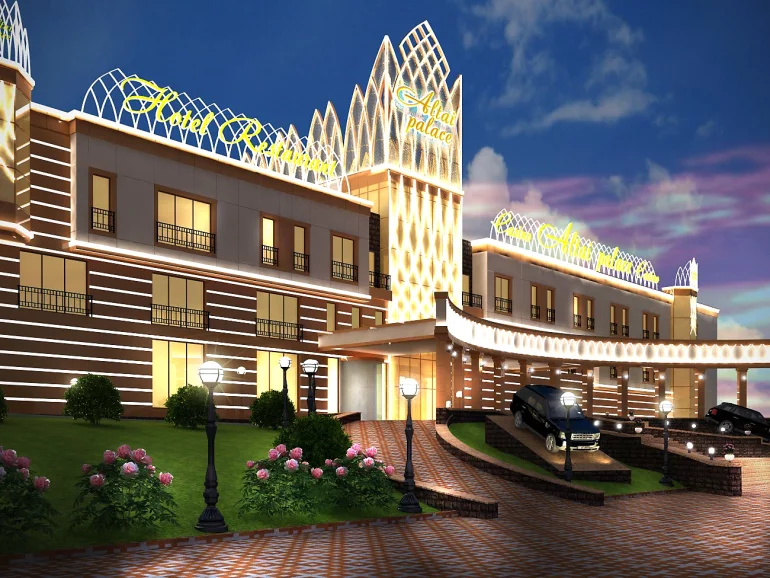
And the company Alti finally pleased its players this year: on November 1, it opened the first casino of the Siberian Coin called Altai Palace. Or instead, not even the casino was opened, but just the first halls: now the casino hall with higher bets is available for players, where there are nine tables for roulette and card games, 50 slot machines, and three small VIP-halls with two tables for roulette and card games in each of them.
Another gambling hall for games on low bets of 1 ruble was opened on December 26 at Altai Palace was opened, and Alti promises to open in March-April 2015 the entire hotel and entertainment complex that is located on an area of 7000 square meters and includes a large hall, the hotel "Four Stars" with 100 places for accommodation, a gym, a restaurant with 120 seats and a SPA.
Thus, changes in the Siberian Coin are clearly visible in 2014, and the first 500 people have already been able to play in the new casino.
Yantarnaya
For this gambling area, 2014 was also a decisive year. According to experts, Yantarnaya was the most attractive of the four initial gambling zones. It seems that this zone possesses all properties to attract investors: good location, almost in the center of Europe, sandy beaches of the Baltic Sea, excellent infrastructure potential of the region, unique amber deposits... Eight years ago, it seemed that the first casino would operate here, but nothing of this kind happened.
Originally, selected areas were not attractive to investors. Experts from Germany and Austria, who came to assess the prospects of constructing a gaming and entertainment center in Yantarnaya, delivered a negative verdict: wealthy players will not travel 50 kilometers on a broken dirt road to play in the casino "in the open field." And the military training center, located in the neighborhood, where soldiers are constantly shooting, does not increase the popularity of this zone.
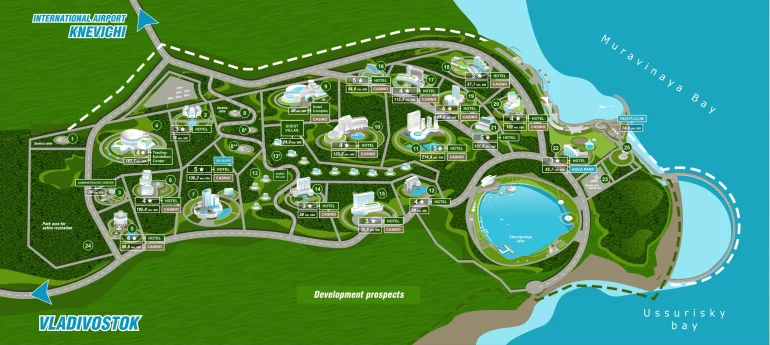
Only in 2014 did the authorities of Kaliningrad successfully expand the boundaries of the gambling zone by adding more attractive areas. Now Yantarnaya is located near the airport and is just a 30-minute drive from Kaliningrad. The neighborhood features a railway station, as well as well-developed transport and energy infrastructure. Thus, the costs for constructing communications in the gambling zone decrease significantly, and these changes immediately attract investors. The Kazan-based company Royal Time Group, which is familiar to us due to its involvement in the construction of the Oracle Casino in Azov-City, has decided to establish its presence in Kaliningrad. Its subsidiary enterprise, JSC Group of STK Companies, won the right to lease an area of 99.5 ha.
The operator does not waste time. The international architectural company with a worldwide reputation, Steelman Partners, was involved in a project in the gambling zone and developed its concept in collaboration with the company AECOM. The project is called Amberland and is designed to last 15 years. It provides an investment of 45 billion rubles. In mid-September, builders began digging a foundation pit for the first phase of the entertainment complex's construction, which would comprise casinos, hotels, and restaurants. The second phase of the gambling cluster includes hotels, conference rooms, SPA centers, and restaurants. In addition, the project will consist of an amusement park for children and adults, a golf course, and a park with a fountain, as outlined in Amberland.
The developer promises that the first casino of Yantarnaya will meet its first visitors on September 1, 2015. We hope that the company Royal Time Group fulfills its promises.
Primorye
"Russian Macau" is the title of Primorye in the media. The organizers of the construction of the gambling zone are the Department of International Cooperation and Development of Tourism of Primorsky Krai and the First Gambling Company of the East. The construction of the first phase of a gaming and entertainment complex began in the spring of 2013, but was halted shortly after due to a lack of funds. In the spring of this year, funds were secured, and construction was resumed, with the project even accelerating. Where, in the spring, only the foundation of the future complex was visible, capital construction is now complete, utilities have been laid, and internal and external finishing works are underway. Developers promise to open the first casino and hotel in May 2015.
The area for the gambling zone is chosen per international standards: the distance from the airport to Primorye is only 12 kilometers, and it is 50 kilometers from the center of Vladivostok. The total area of this zone is 619 ha, and it will be located on the bank of the Ussuri Bay, among the picturesque hills. And the gambling cluster occupies only one-fifth of the area:
"The gambling zone is not only hotels and casinos. The current international experience shows that the entertainment component will occupy about 20 percent of the territory of Primorye".
Everything else is additional services, including entertainment, family recreation, walking areas, a splendid quay, attractive exclusive shops, particularly for tourists from China, water parks, a theater, and others. The list can be very long. The gambling zone Primorye will be the largest gambling complex in the Russian Federation. We left the rest of the world behind", - said the Deputy Director of the Department of International Cooperation and Tourism of Primorsky Krai, Konstantin Shestakov.
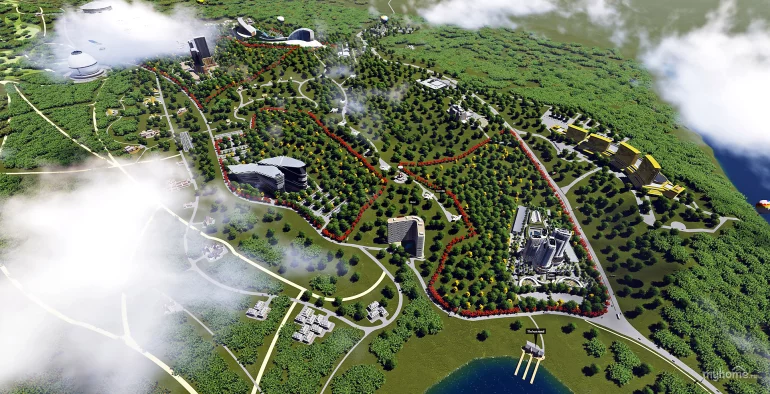
The gambling zone of Primorye is unique among all the gambling zones in Russia. Firstly, it is designed for foreign players, primarily from China, Japan, and Korea. Russian Macau is going to lure residents of Northern China, who do not want to spend eight hours on a flight to Macau in China, and this is, by the way, over a hundred million potential visitors. Besides, Primorye is also built by the Chinese. Two dormitories with all amenities were built for them next to the construction site. Finishing materials and decorative elements are also purchased in China.
Secondly, it is the only gambling zone that interests foreign investors. It is a corporation, Naga Corp, from Cambodia. In December, employees of Naga Corp presented a project for a hotel complex in the future gambling zone, which the Administration of the Primorsky Krai approved. Soon, the company will develop a design and estimate documentation of the future complex, and then begin construction. Naga Corp plans to invest approximately $1 billion in the development of the gaming zone.
Crimea and Sochi
Gambling zones in Crimea and Sochi were established only in 2014. There is no doubt that gambling and tourism in Crimea have a high potential (as discussed in a separate article on Casinoz). Still, it is too early to say that the gambling zone on the peninsula is about to start its activities. It will require a significant amount of time and financial investment to create high-quality infrastructure and services that meet international standards. Investors know how to count money and will not work without any profit. Therefore, we will likely wait a few years for the opening of a gambling zone in Crimea, despite all the efforts of the federal and regional authorities to create a favorable investment climate.
Additionally, note that the United States, Europe, and Ukraine are making efforts to make this investment climate less favorable. Recent events have included additional sanctions from the US Administration against Crimea, the termination of Visa and MasterCard payment services on the peninsula, the cancellation of train and bus services to Crimea from Ukraine, and problems with electricity and water. These events do not encourage investment in Crimea.
Now, there is no designated place for a gambling zone in Crimea. The opinion of the President of the Multitour Company, Alexei Vysokanov, reflects the current situation of gambling in Crimea:
"The establishment of gambling zones will be an additional advantage for resorts, but global positive changes will not be seen immediately. It takes time to develop all that. The time is required to start building casinos, to make an advertisement of them and to attract visitors. In any case, this will last two or three years".
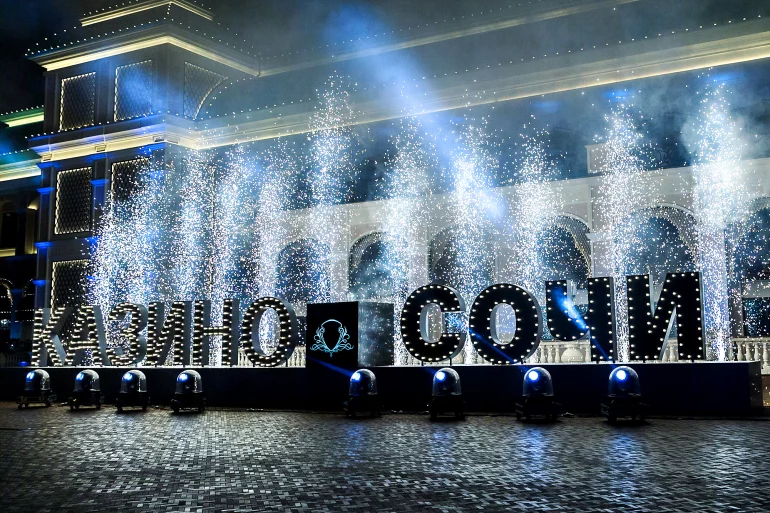
As for Sochi, the gambling zone there appears to be much more attractive than in Crimea from the perspective of short-term prospects. The infrastructure necessary for conducting gambling activities has already been created in Sochi, but it remains idle after the Olympic Games. Forty-nine four-star and five-star hotels, as well as a variety of restaurants, shopping centers, and clubs, were built there. Everything tourists need for entertainment is available. Currently, Sochi can accommodate 160,000 tourists simultaneously. This is a great potential.
Therefore, promises of officials about the opening of the first casino in the spring, at the beginning of the tourist season, can be realized. For example, the mayor of Sochi, Anatoly Pakhomov, says that this will happen in May:
We now have open skies, we will most likely have 72-hour visa-free stay in Sochi next year and we will open the gambling zone in May. This contributes to this great interest in Sochi.
Reliable information about the place of the opening of the first legal casino in Sochi is unavailable. Most likely, the gambling cluster will be located in Krasnaya Polyana, where the "Gorky Gorod" is situated. This area encompasses residential and commercial real estate with a total area of over 600,000 square meters, including the "Olympic Village" for media. It will be cheaper to develop these areas for the gambling establishments than the area for the restaurant. There are many other suitable buildings as well. So, we hope that everyone will be able to play in the casinos of Sochi in the spring.
Illegal casinos
Since it is almost impossible to gamble legally in Russia (except for 3-4 official casinos in designated gambling zones that are currently open), it is not surprising that underground casinos have sprung up like mushrooms after the rain in all cities across the country. According to unofficial data, there are even more casinos than before the ban. For many players, the fact that they play illegally turned into an additional source of adrenaline. Players feel engaged in some kind of spy game when they have to play through the quest with SMS and checks for surveillance while visiting the casino, as well as recognizing themselves as members of a certain closed VIP club.
How does it work? An entrepreneur opens a typical Internet cafe - this business will appear to be that on paper. Then, it is necessary to purchase gaming Internet terminals, which are connected to the network through a conventional PC, where the administrator is seated, or to special payment devices that receive and dispense money. The administrator gets money from users, credits an account on the selected slot machine, and issues winnings.
Currently, a popular option is to download the online casino program to the terminal from a flash card at the beginning of the working day. The flash card is then removed and hidden, and the devices operate as "slot machines". If the device is rebooted (in case of verification), a normal desktop appears without any traces of the previously launched online casino applications. This makes the legal business of gaming terminals more secure.
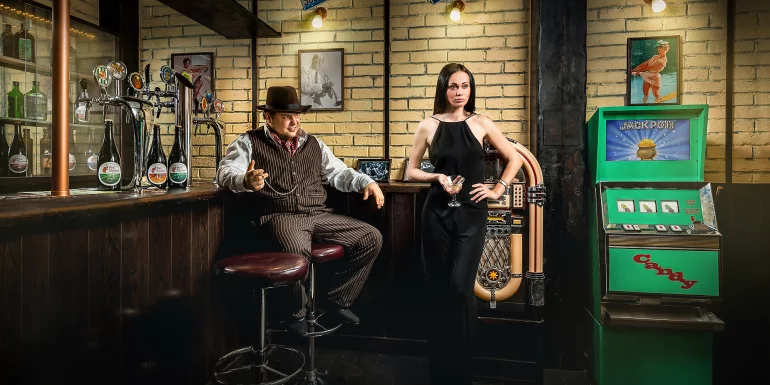
It is also offered to avoid taxes: "Taxes are paid by online casinos in their offshore zones, and you also pay taxes as Internet cafes and authorized payment centers." The company offering these services indicates that, under the law, the entrepreneur is only allowed to open an Internet cafe, where access to certain content is provided through the use of terminals.
Law enforcement authorities have closed more than 73 thousand illegal gambling establishments in just five years and confiscated 1 million units of gambling equipment. The struggle against illegal casinos was very active in 2014. If you search for "illegal casinos" in Yandex, you can see reports about closing illegal casinos almost every day. However, this does not help much. Underground casinos are of two types: low-cost and luxury. And mainly the first ones are closed, because high-ranking officials can play in luxury casinos, and the police just can not dare to close them.
This year, two events would surely worsen the situation of illegal gambling establishments. The first event is the creation of a system of civilian control over the unlawful gambling business by the Public Council within the Ministry of Internal Affairs. It will start operating in 2015. How will it work? The special website kartakazino.rf has already been operating, where any person can report to the Ministry of Internal Affairs about any illegal casino, provide its location, and view how the police respond to their information. In the future, these interactive maps will be integrated into social networks and mobile applications. Thus, the Ministry of Internal Affairs relies on concerned citizens.
The second factor that should influence the illegal casinos is the law on strengthening criminal responsibility for the organization of gambling, including on the Internet, which was signed by the President of Russia, Vladimir Putin, in December 2014. This law provides penalties for organizing illegal casinos, including on the Internet: a fine from 300 to 500 thousand rubles or in the amount of income for a period from one to three years, compulsory labor from 180 to 240 hours, and up to four years of restraint of liberty or up to two years imprisonment. In addition, this law imposes fines for organizing and conducting gambling games at bookmakers and betting establishments without a license, outside designated gambling zones, as well as for engaging in gambling activities that generate a substantial income.
It seems that the underground casinos will have a hard time in 2015. It is not enough that new legal casinos are opened in the gambling zones, and draconian fines and real prison sentences will also add adrenaline in the life of the organizers of illegal casinos. And, of course, competition from online establishments becomes tougher.
Online casinos
The company Global Opinion investigated the Russian Internet in autumn 2014 and found that the number of gambling sites had increased by three types in the first 9 months. What is the reason for such rapid growth?
It is not officially prohibited to play in online casinos in Russia, but as it is stated in the law, "activities for the organization and conduction of gambling, including the use of information and telecommunication networks and means of communications are prohibited". Therefore, all Russian casinos are registered in other countries.
An extraordinary event happened in the world of Russian online gambling in March: the Federal Service for Supervision of Communications, Information Technology and Mass Media (Roskomnadzor) banned access to more than fifty gambling resources, such as casinos, bookmakers and poker rooms, the best known of which are Pokerstars, Fonbet, Redkings, Patypoker, Betaway, Titancasino, Casinoeuro, and Titanpoker. Soon, however, it was forced to unblock them, as a gap in the legislation had been beneficially exploited by online gambling resources.
The essence of this gap, by the representative of Roskomnadzor Vadim Ampelonsky:
"In accordance with the law' On information', before blocking a resource, we must notify its hosting provider about it and give three days to remove illegal information. In the case of a change of the hosting provider, we have to go through this procedure again, which we have already made in regard to these resources".
And the director for strategic marketing of the Internet Research Institute, Irina Levova, states the fact:
"This case means a gap in the legislation. The owner of the resource present in the register of banned sites can achieve delisting for three days by changing the hosting provider, and then repeat this procedure".
Thus, the majority of new gambling online resources that appeared in 2014 in the Russian segment of the Internet are not new players on the gambling market, but just copies of all the same old online establishments of key market players, who circumvent the blocking by Roskomnadzor or remove their business from the Russian domain zones. The share of absolutely new online resources does not exceed 20%, and most of them are fraudulent, created using a public script of online casinos that any Internet user can download.
Another extraordinary event in online gambling occurred in August: an unknown Canadian company, Amaya, acquired the two largest and most popular online poker rooms, PokerStars and Full Tilt. Moreover, after the "deal of the century," Amaya announced its intention to become the undisputed leader in online gambling. She created an advertisement for the development of an online casino and bookmaker on the PokerStars platform. New software has already been developed for two platforms - mobile and stationary, which is adapted to all more or less popular operating systems, smartphones, and tablets.
This software has already been locally tested in Spain. Its weaknesses and shortcomings were identified. Now they are eliminated, and in early 2015, the players from all over the world will be able to play in the online casino PokerStars. Of course, this is good news for Russian players, because the new high-quality and trustworthy online casinos do not appear so often. The market is already divided between the major players, and now a new online casino has appeared, promising to be one of the best even before its opening!
Conclusion
Let us make a summary. In 2014, we saw all the new laws on gambling and attempts to block access to foreign casinos and other gambling resources for Russian citizens. This was motivated by the struggle against illegal business and the protection of citizens from the harmful effects of gambling. But in case of the battle against illegal casinos in the country, such a motivation has the right to exist. In the field of online gambling, the struggle against gambling establishments looks like a clumsy attempt to stop the outflow of money from Russia abroad. Roskomnadzor has failed yet. Casinos have found the antidote, but who knows what thoughts will be born in the brilliant minds of officials. It is also difficult to cope with underground casinos. Despite all the raids and their closure, their number does not decrease. It is likely that the new "draconian" law and the system of civilian control over the illegal gambling business, created by the Public Council within the Ministry of Internal Affairs, will be able to influence the course of the state's struggle with this Lernaean Hydra.
Undoubted successes are visible in this year in the field of offline gambling. The third phase of the construction of the entertainment complex Oracle was launched in Azov City, and the first casino, Altai Palace, was opened in Siberian Coin. Funds were found in Primorye, and the major construction of the entertainment and gaming complex Mayak was completed. There are good chances that in the spring of 2015, the first casino will be opened there. And even in Yantarnaya, there is significant progress. The investor was found. The project was ready, and finally, the construction began.
The new gambling zones in Crimea and Sochi can also be considered positive results, taking into account the nonzero probability of the opening of the first casino in Sochi in the spring.
Anyway, the year is almost over, and all events will take place in the new 2015 and the portal Casinoz will surely cover them. Now, let me wish you never lose hope for the best, be optimistic, good health, and, of course, good luck that is so necessary to all players!
UPD: Current State of the Gambling Industry
Since 2015, the Russian Federation has maintained a stringent and evolving regulatory framework for gambling activities. While certain forms of gaming are permitted, the overarching policy has been one of strict control, aiming to centralize and limit gambling to specific areas and formats. This article provides a detailed overview of the key developments, challenges, and the current state of the gaming sector in Russia over the past decade.
Key Legislative Changes and Regulations
The foundation of gambling regulation in Russia is Federal Law No. 244-FZ, enacted in December 2006, which largely banned gambling across the country with the exception of specially designated zones. Since 2015, further amendments and enforcement measures have shaped the sector:
Online Gambling Crackdown
- In 2015, Russia intensified efforts to prohibit online gaming transactions. The Ministry of Finance introduced bills aimed at blocking banks from processing payments to unlicensed online gaming operators.
- Roskomnadzor, the federal service responsible for media supervision, actively maintains a blacklist of online gambling sites, including poker platforms, and mandates internet service providers to block access to them.
- Despite these efforts, some offshore operators continued to serve Russian players, although the legal environment remains highly restrictive for online casinos and poker.
Focus on Sports Betting
- Unlike other forms of online gambling, sports betting has seen a different trajectory. Regulated online sports betting became legally established through the "Interactive Bet" (TSUPIS) system. This system serves as a central hub for all legal online betting transactions, providing a layer of oversight and taxation.
- Amendments in 2019 further solidified the legal basis for online bookmaking, making it an exclusive exception to the general prohibition on remote gambling.
Designated Gambling Zones
A cornerstone of Russian gambling policy is the confinement of land-based casinos and electronic gaming machines (EGMs) to specific, remote gambling zones. This approach aims to control the industry and potentially boost regional tourism and investment. As of 2015, and continuing to the present, these zones include:
- Siberian Coin (Altai Republic)
- Yantarnaya (Kaliningrad Oblast)
- Krasnaya Polyana (near Sochi)
- Primorye (Artyom, Primorsky Krai)
Closure of Azov City
Notably, the "Azov City" gambling zone in the Krasnodar region, one of the first established, faced liquidation after 2015 due to new legislation that aimed to consolidate gambling activities primarily around the Sochi Olympic infrastructure. This closure incurred significant costs for the government in compensating investors.
Challenges and Impact on the Industry
The strict regulations have presented both opportunities and significant challenges for the gambling sector in Russia.
Combating Illegal Operations
The tight restrictions have led to a persistent underground gambling market. Russian authorities continuously battle illegal operations, including unlicensed online platforms and clandestine land-based establishments. This ongoing struggle highlights the complexities of enforcing comprehensive bans in the digital age.
Economic Implications
While the government aims to generate tax revenue from legal gambling, the overall economic contribution is limited by the restrictive framework. The focus on designated zones means that the financial benefits are localized, and the broader potential of a more open market is not realized. Estimates suggest billions are spent on illegal online gambling annually, representing a significant loss in potential tax income.
International Operator Engagement
The strict regulatory environment makes it challenging for international gambling operators to enter the Russian market legally, particularly for online casino and poker services. Those interested in the betting market often need to partner with local bookmakers or establish a Russian entity to comply with regulations, including the TSUPIS system.
The Future of Gambling in Russia
The outlook for gambling in Russia suggests a continued adherence to the current model of restricted, designated zones for land-based casinos and tightly controlled online sports betting. There are no indications of a move towards widespread legalization of online casino games or poker soon. Recent developments indicate a focus on:
- Further strengthening measures against illegal online gambling, including potential targeting of cryptocurrency payments used by unlicensed platforms.
- Maintaining strict oversight of licensed bookmakers and ensuring all interactive bets are processed through approved systems.
- Continuing to develop the established gambling zones, aiming to attract tourism and investment to these specific regions.
The Russian gambling sector operates in a highly regulated environment, striking a balance between state control, revenue generation, and social considerations. While sports betting has established a legal foothold online, the broader gaming sector remains subject to significant limitations.














